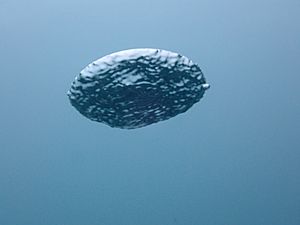Physical object facts for kids
A physical object is something you can see, touch, or measure. It's a collection of matter that takes up space. Think of a rock, a car, or even a tiny dust particle. These are all physical objects.
Every physical object has a clear boundary or surface. This boundary helps us tell what's part of the object and what isn't. For example, the skin of an apple is its boundary. This boundary can change over time, like when an apple gets a bruise.
Physical objects can move around, spin, or even change shape. But the matter inside them usually moves together as one piece. Even if parts of an object change, like a car getting new tires, we still think of it as the same object.
What is a Physical Object?
A physical object is basically anything that exists in the real world and takes up space. We learn about objects by using our senses, like sight and touch. Our brains then figure out what the object is based on what we perceive.
Imagine a fossilized skull stuck inside a rock. Even though it's surrounded by rock, we can still tell it's a separate object. This is because the skull has different properties from the rock around it.
How Objects Change and Keep Their Identity
Objects can change over time. A rock might wear down, or a piece might break off. But we still consider it the same rock. This is true as long as it's simpler to think of it as the same object rather than a new one.
For example, if a car gets all its wheels changed, it's still the same car. Its identity continues because it's easier to describe it that way.
However, an object's identity cannot split. If you break a plate into two pieces, only one piece (or neither) can be considered the "original" plate. The identity of an object can also disappear if it's no longer useful to think of it as a single object.
Parts of an Object
Many objects are made of smaller parts. For instance, a car is made of an engine, wheels, and seats. Each of these parts can also be considered an object on its own. These smaller objects are called components when they are inside a larger object.
Objects in Classical Physics
In classical mechanics, which studies how things move, a physical object is a collection of matter. This matter has properties like mass (how much "stuff" it has), velocity (how fast it's moving), and energy.
Objects take up a certain amount of three-dimensional space. This is called their extension. How objects interact with each other often depends on their shape and how they are positioned.
Classical physics can also describe objects as being made of tiny, tiny pieces. These pieces interact with each other through forces like pressure and mechanical stress.
Objects in Quantum Physics
In quantum mechanics, which studies the very smallest particles, objects are seen differently. A particle, like an electron, doesn't have a fixed position until it's measured. Instead, it's described by a probability distribution. This means there's a chance of finding the particle at different places.
There's also a limit to how accurately we can measure a particle's position and speed at the same time. These ideas are quite different from how we usually think about everyday objects.
Objects in Psychology
In some areas of psychology, a physical object is something that has real, measurable properties. This is different from "mental objects," like thoughts or feelings, which exist only in our minds.
For example, a human body is a physical object. Psychologists might study how our brains understand and react to physical objects in the world around us.
Objects in Philosophy
In philosophy, a physical object is something that lasts over time and exists in the physical world. This is different from abstract objects, like numbers or ideas, which don't have a specific time or place.
Examples of physical objects include a cloud, a banana, or a proton. Things that are not physical objects are emotions, the idea of "justice", or the number "3".
See also
- Deformable body
- Human body
- Rigid body
- Ship of Theseus, a famous thought experiment about an object's identity over time
 In Spanish: Objeto físico para niños
In Spanish: Objeto físico para niños
 | Frances Mary Albrier |
 | Whitney Young |
 | Muhammad Ali |


